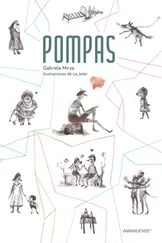After the death of my mother, I would be kept awake by my terror that someone might touch me while I was sleeping. One night I felt her touch, but her voice restored my serenity: Figlio mio poveretto . I felt the same thing late one night in Delgadina’s room, and I twisted with delight, believing she had touched me. But no: it was Rosa Cabarcas in the dark. Get dressed and come with me, she said, I have a serious problem.
She did, and it was more serious than I could have imagined. One of the house’s important clients had been stabbed to death in the first room in the pavilion. The killer had escaped. The enormous corpse, naked but with shoes on, had the pallor of steamed chicken in the blood-soaked bed. I recognized him as soon as I walked in: it was J.M.B., an important banker, famous for his elegant bearing, his good nature, his fine clothes, and above all for the smartness of his home. On his neck he had two purple wounds like lips, and a gash on his belly was still bleeding. Rigor had not yet set in. more than his wounds, what struck me was that he wore a condom, to all appearances unused, on his sex that was shrunken by death.
Rosa Cabarcas did not know whom he had been with because he too had the privilege of coming in by the orchard entrance. The suspicion was not discounted that his companion might have been another man. The only thing the owner wanted from me was help in dressing the body. She was so steady that I was disturbed by the idea that, for her, death was a mere kitchen matter. There’s nothing more difficult than dressing a dead man, I said. I’ve done it more than once, she replied. It’s easy if somebody holds him for me. I pointed out: Who do you imagine is going to believe that a body sliced up by stab wounds is inside the undamaged clothes of an English gentleman?
I trembled for Delgadina. The best thing would be for you to take her with you, said Rosa Cabarcas. I’d rather die first, I said, my saliva icy. She saw this and could not hide her disdain: You’re trembling! For her, I said, though it was only half true. Tell her to leave before anybody comes. All right, she said, though as a reporter nothing will happen to you. Or to you either, I said with a certain rancor. You’re the only liberal with power in this government.
The city, so sought-after for its peaceful nature and congenital safety, was degraded by the misfortune of a scandalous, brutal murder every year. This one wasn’t it. The official news report, with headlines that were too big and details that were too scant, said the young banker had been attacked and stabbed to death for unknown reasons on the Pradomar highway. He had no enemies. The government communiqué indicated that the presumed killers were refugees from the interior of the country who were unleashing a crime wave foreign to the civic spirit of the city’s residents. In the first few hours more than fifty arrests were made.
Scandalized, I turned to the legal reporter, a typical newspaperman from the twenties who were a green eyeshade and elastic bands on his sleeves and took pride in anticipating the facts. He, however, knew only a few stray threads of the crime, and I filled him in as much as prudence would allow. And so with four hands we wrote five pages of copy for an eight-column article on the front page, attributed to the eternal phantom of reliable sources in whom we had complete confidence. But the Abominable No-Man-the censor-did not hesitate to impose the official version that it had been an attack by liberal outlaws. I purified my conscience with a scowl of mourning at the most cynical and well-attended funeral of the country.
When I returned home that night I called Rosa Cabarcas to find out what had happened to Delgadina, but she did not answer the phone for four days. On the fifth I went to her house with clenched teeth. The doors were sealed, not by the police but by the health department. Nobody in the area knew anything about anything. With no sign of Delgadina, I began a furious and at times ridiculous search that left me gasping for breath. I spent entire days observing young female cyclists from the benches in a dusty park where children at play climbed to the top of the peeling statue of Simon Bolivar. They pedaled past like a doe: beautiful, available, ready to be caught in a game of blindman’s bluff. When I had no more hope I took in the refuge in the peace of boleros. That was like a lethal potion: every word was Delgadina. I always had needed silence to write because my mind would pay more attentions to the music than my writing. Now it was the reverse: I could write only in the shade of boleros. My life became filled with her. The columns I wrote during those two weeks were models in code for love letters. The managing editor, annoyed by the avalanche of responses, asked me to moderate the love while we thought of a way to console so many lovelorn readers.
The lack of serenity put an end to the precision of my days. I woke at five but stayed in the darkened room imagining Delgadina in her unreal life as she woke her brothers and sisters, dressed them for school, gave them breakfast if there was any food, and bicycled across the city to serve out her sentence of sewing buttons. I asked myself in astonishment: What does a woman think about while she attaches a button? Did she think of me? Was she also looking for Rosa Cabarcas to find out about me? For a week I did not take off my mechanic’s coverall day or night, I did not bathe or shave or brush my teeth, because love taught me too late that you groom yourself for someone, you dress and perfume yourself for someone, and I’d never had anyone to do that for. Damiana thought I was sick when she found me naked in the hammock at ten in the morning. I looked at her with eyes clouded by desire and invited her to a naked roll in the hay. She, with some scorn, said:
“Have you thought about what you’ll do if I say yes?”
In this way I learned how much my suffering had corrupted me. I did not recognize myself in my adolescent’s pain. I did not go out, so as not to leave the phone unattended. I wrote without taking it off the hook, and at the first ring I would rush to answer it, thinking it might be Rosa Cabarcas. I kept interrupting whatever I was doing to call her, and I repeated this for days on end until I realized it was a phone without a heart.
When I returned home one rainy afternoon I found the cat curled up on the front steps. He was dirty, battered, and so meek it filled me with compassion. The manual informed me he was sick, and I followed its rules for making him feel better. Then, all at once, while I was having a siesta, I was awakened by the idea that he could lead me to Delgadina’s house. I carried him in a shopping bag to Rosa Cabarcas’s shop, still sealed and showing no signs of life, but he twisted around so much in the bag that he managed to escape, jumped over the orchard wall, and disappeared among the trees. I banged on the door with my fist, and a military voice asked without opening it: Who goes there? A friend, I said, not to be outdone. I’m looking for the owner. There is no owner, said the voice. At least open up so I can get my cat, I insisted. There is no cat, it said. I asked: Who are you?
“Nobody,” said the voice.
I always had understood the dying of love was mere poetic license. That afternoon, back home again without the cat and without her, I proved that it was only possible but that I myself, an old man without anyone, was dying of love. But I also realized that the contrary was true as well: I would not have traded the delights of my suffering for anything in the world. I had spent more than fifteen years trying to translate the poems of Leopardi, and only on the afternoon did I have a profound sense of them: Ah, me, if this is love, then how it torments .
My going to the paper in coverall and unshaven awoke certain doubts regarding my mental state. The remodeled offices, with individual glass cubicles and skylights, looked like a maternity hospital. The artificial climate, silent and comfortable, invited speaking in whispers and walking on tiptoe. In the lobby, like dead viceroys, were oil portraits of three editors-for-life and photographs of illustrious visitors. The enormous main room was presided over by the gigantic photograph of the current editorial staff taken on the afternoon of my birthday. I could not avoid a mental comparison to the one taken when I was thirty, and once again I confirmed with horror that one ages more and with more intensity in pictures than reality. The secretary who had kissed me on the afternoon of my birthday asked if I was sick. I was happy to respond with the truth so she would not believe it: Sick with love. She said: Too bad it’s not for me! I returned the compliment: Don’t be so sure.
Читать дальше












